when 用法小结
when的特殊用法

2. I was walking along the river ____ I heard a cry for help .
A. while B. since C. when D. as
3. We were swimming in the lake ______ suddenly the storm started .
A. when B. while C. until D. before
4.Jasmine was holidaying with her family in a wildlife park _____ she was bitten on the leg by a lion .
A. when B. while C. since D. once
… be just going to do.. when… 正要…这时
… had just done … when.. 刚做了..这时
… be on the point of doing .. when 正要…这时
1.I was about to swim in the river ____ the guide told me there were man-eating fish in it .
A. walked , when B. is walking , as C. was walking , when D. was walking , while
11. Jack had flown thousands of miles ____ his enginethe desert .
A. while B. when C. before D. after
九大状语从句重难点讲解

状语从句分类:(九大类)时间、地点、原因、条件、让步、结果、目的、方式、比较。
Part 1 时间状语从句:最常用的连接词:When,while,as , before , after , as soon as, until, not until次常见的连接词:The moment\minute, immediately, hardly…when, no sooner than问题一:●We wew swimming in the lake_______suddenly the storm started.A\when B\while C\until D\before●He was about to tell me the secret ______someone patted him on the shoulder A\as B\until C\while D\when●-Did Jack come back early last night? -Yes,it was not yet 8:00 _____hearrived home.A\before B\when C\that D\until●He was about halfway through his meal______a familiar voice came to his ears. A\why B\where C\when D\while一、时间状从中连接词when的用法小结:1、when引导的时间状从的谓语动词可以是可延续的,也可以是表短暂性的动词,可用于主句和从句动作同时发生或从句动作先于主句动作。
例:When the film ended,the people went back.When I lived there,I used to go to the seashore on Sundays.2、可用作并列连词,其意义是“那时,这时”,相当于and at this\that time.常用于以下句式:was about to do sth. … when…\be (on the point of) doing sth. …when…(刚要…这时突然…)e.g.I was about to stop pretending to being listening to the class to listen towhat the teachers said when Mr. Li shouted at me so loudly that the whole class can hear.3、还可以表示原因“既然”,相当于since,considering that.如:It was foolish of you to take a taxi when you could easily walk there in 5 minutes.问题二:●The cost of living in Glasgow is among the lowest in Britain,_____the qualityof life is probably one of the highest.A\since B\when C\as D\while●______I accept that he is not perfect,I do actually like the person.A\While B\Since C\Before D\Unless二、时间状从中连接词while 的用法小结:1、while 引导的动作必须是持续性的,强调某一段时间内,主从句动作同时发生,或主从句中的动作或事物在从句中的动作或事情的进展过程中发生。
专升本英语-状语从句ppt课件

时间状语从句
till, until 和 not…until… 的用法 1. until/till引导时间状语从句用于 肯定句时,
主句的动词是延续性动词 ,表示动作或状态 一直持续到 until/till所表示的时间,意为“ 某动作一直延续到某时间点才停止 ”。 We waited till/until he came. 2. 用于否定句时,主句谓语动词是非延续性动 词,从句为肯定,意为“ 某动作直到某时间
时间状语从句
3. __C____ the day went on, the weather got
worse. A. With
B. Since D C. As
D. While
4. It will be a long time
Peter
his work.
时间状语从句
5. We were jusCt
时间状语从句
since引导的时间状语从句,常译为“ 自从 ……”, 主句常用现在完成时 ,从句常用一般过去时 。 We haven't seen each other since we parted.
常用句型:It is/It has been + 时间段 + since从句
“自从……有多长时间了 since she
works, you need to have some
knowledge oBf chemistry.
A. In order to B. So as to C. In
order that D. So that
结果状语从句
结果状语从句
1. so… that… (如此…以至于…), so 后 面应用形容词或副词, 有时省略so只用 that
when 和while 用法小结
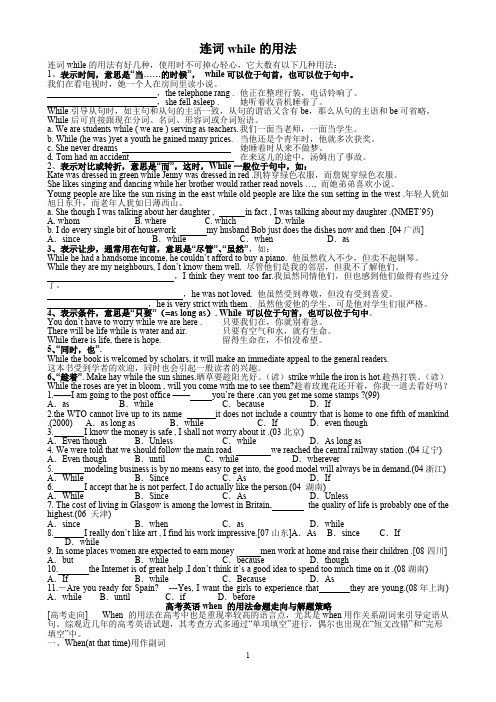
连词while的用法连词while的用法有好几种,使用时不可掉心轻心,它大数有以下几种用法:1、表示时间,意思是“当……的时候”,while可以位于句首,也可以位于句中。
我们在看电视时,她一个人在房间里读小说。
,the telephone rang .他正在整理行装,电话铃响了。
,she fell asleep .她听着收音机睡着了。
While引导从句时,如主句和从句的主语一致,从句的谓语又含有be,那么从句的主语和be可省略,While后可直接跟现在分词、名词、形容词或介词短语。
a. We are students while ( we are ) serving as teachers.我们一面当老师,一面当学生。
b. While (he was )yet a youth he gained many prices.当他还是个青年时,他就多次获奖。
c. She never dreams 她睡着时从来不做梦。
d. Tom had an accident 在来这儿的途中,汤姆出了事故。
2、表示对比或转折,意思是“而”,这时,While一般位于句中,如:Kate was dressed in green while Jenny was dressed in red .凯特穿绿色衣服,而詹妮穿绿色衣服。
She likes singing and dancing while her brother would rather read novels …, 而她弟弟喜欢小说。
Young people are like the sun rising in the east while old people are like the sun setting in the west .年轻人犹如旭日东升,而老年人犹如日薄西山。
a. She though I was talking about her daughter , in fact , I was talking about my daughter .(NMET’95)A. whomB. whereC. whichD. whileb. I do every single bit of housework my husband Bob just does the dishes now and then .[04广西] A.since B.while C.when D.as3、表示让步,通常用在句首,意思是“尽管”、“虽然”,如:While he had a handsome income, he couldn’t afford to buy a piano.他虽然收入不少,但卖不起钢琴。
高考It++be++时间+++从句”结构总结

高考It +be+ 时间+ 从句”结构总结一在“It +be+ 时间+ 从句”结构中,引导从句的从属连词有before, that, since, until (till ), when 等。
这一结构是近几年高考常考的知识点,现将它们的用法小结如下:一、It +be (not )+ 时间段+before 从句。
其中的主句是肯定式时,意为“过多长时间才……”;主句是否定式时,意为“没过多久就……”。
例如:1. It was not long before the whole country rose and drove the Austrian soldiers from their homeland. 不久,全国人民便奋起反抗,把奥地利军队从他们的国土上赶了出去。
2. It may be five or six years before the new medicine is tested on human beings.要过五六年时间这种新药才能在人身上做试验。
3. It was two months before he designed the bridge. 过了两个月,他设计出了这座桥梁。
二、It +will be (was )+ 时间段+until 从句若主句中用一般将来时,则从句中用一般现在时,意思是从现在起到从句中谓语动词表示的动作发生时还有多长时间;若主句中用一般过去时,则从句中也用一般过去时,意思是从过去某一时间起到从句中谓语动词表示的动作发生还有多长时间。
例如:1. It will be ten days until my birthday comes. 到我生日还有十天。
2. It was only five minutes until her husband came back from work.当时离她丈夫下班只有五分钟了。
注意:结构“一”与结构“二”在肯定句中几乎可以通用。
when的用法小结

when 用法小结不管是在口语中,还是在书面语中,when是一个十分活跃的词,该词主要用作连词和副词,但是在意义方面其用法比较复杂。
一、作副词1. 作疑问副词,用于构成特殊疑问句,意为“什么时候;何时”。
When will they come back?他们什么时间回来?When can you finish the work? 你什么时间能完成这项工作?2. 作连接副词,引导名词性从句,或与不定式连用,意为“什么时候”。
Can you tell me when the bank opens?你能告诉我银行什么时候开门吗?When she'll be back depends on the weather. 她何时回来取决于天气。
Have you decided when to go sightseeing?你们已经决定什么时候去郊游了吗?3. 作关系副词,引导定语从句。
The main school holidays are from mid-December till early February,when the days are long and warm. 学校的主要假期是从12 月中旬到2 月初,这段时间里白天长而且很温暖。
Do you remember the time when the three of us went on a holiday in Guilin?你还记得我们三个人在桂林度假的那段时光吗?二、作从属连词,引导状语从句。
1. 表示时间,意为“当……时;在……的时候”。
When you see him, please say hello to him. 见到他时,代我问他好。
When I reached the station,the train had left. 当我到达火车站时,火车已经开走了。
2. 表示条件,相当于if。
How can I get a job when I can't even read or write?如果我连读和写都不会,我怎么能找到工作呢?3. 表示对比,相当于whereas, while, since, 意为“既然;然而”。
when 用法

动词不定式中的省略现象动词不定式中的省略现象可分为两种情况,一是动词不定式符号to后的动词部分的省略;二是动词不定式符号to的省略.一,省略动词不定式符号to后的动词部分的情况1.一些表示心理活动,情感态度的动词或短语,如expect \want \hope \wish \love \hate \decide \plan \mean \try \would like \be ready \be afraid \be glad等后,动词不定式省略to后面的动词部分,但保留to.例如:(1)-I 'll be away on a business trip.Would you mind looking after my dog-Not at all .I'd be glad to.(2)-Will you go with me-Well ,I 'd like to.(3)-Will you go home tomorrow-No.I 'm going to a lecture,or at least I am planning to.2.不定式作宾语补足语时,省略to后的动词部分,即用to代替整个不定式.例如:(1)The boy wanted to ride his bicycle in the street but his mother told him not to.(2)You'd better finish the job on time if he ordered you to.3.在一些情态动词或助动词ought to \have to \used to \be able to后.例如:(1)-Must I go now-No.You don 't have to.(2)-Are you planning to see your grandfather-No.But I ought to.不消费日是抗议消费主义的一个非正式日子,由加拿大温哥华艺术家特德·戴夫(Ted Dave)于1992年发起,加拿大《Adbusters》杂志推动。
when的用法总结大全
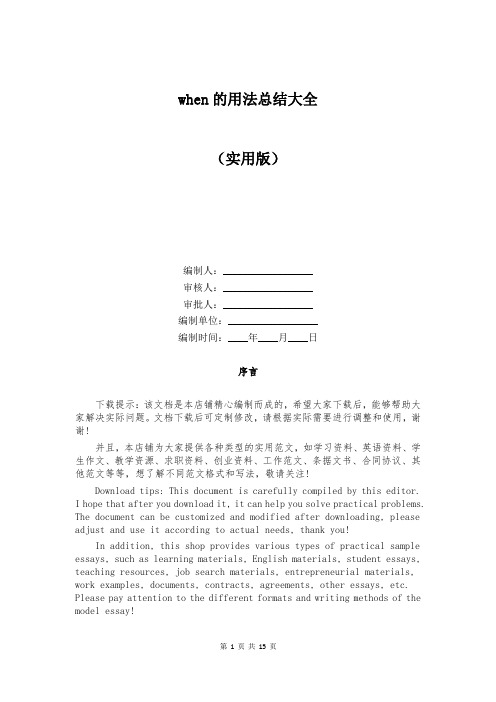
when的用法总结大全(实用版)编制人:__________________审核人:__________________审批人:__________________编制单位:__________________编制时间:____年____月____日序言下载提示:该文档是本店铺精心编制而成的,希望大家下载后,能够帮助大家解决实际问题。
文档下载后可定制修改,请根据实际需要进行调整和使用,谢谢!并且,本店铺为大家提供各种类型的实用范文,如学习资料、英语资料、学生作文、教学资源、求职资料、创业资料、工作范文、条据文书、合同协议、其他范文等等,想了解不同范文格式和写法,敬请关注!Download tips: This document is carefully compiled by this editor.I hope that after you download it, it can help you solve practical problems. The document can be customized and modified after downloading, please adjust and use it according to actual needs, thank you!In addition, this shop provides various types of practical sample essays, such as learning materials, English materials, student essays, teaching resources, job search materials, entrepreneurial materials, work examples, documents, contracts, agreements, other essays, etc. Please pay attention to the different formats and writing methods of the model essay!when的用法总结大全when的用法你知道多少,今天本店铺给大家带来when的用法,希望能够帮助到大家,下面本店铺就和大家分享,来欣赏一下吧。
when 用法小结

when 用法小结When 是一个常见的英语词汇,用于表达时间、条件或原因。
它有多种用法,下面将对这些用法进行小结。
1. 表示时间的用法1.1 定义时间点当 When 用来表示特定的时间点时,通常配合具体的日期或者时间使用。
例如:- I was born in 1990 when the Berlin Wall finally fell.(当柏林墙终于倒塌时,我出生了。
)- When did you arrive at the airport?(你什么时候到达机场的?)1.2 表示一段时间当 When 用来表示一段时间时,可以与介词 for 或 during 搭配使用。
例如:- I will be away on a business trip for a week starting from tomorrow. When I'm away, please take care of my plants.(从明天开始,我将因出差离开一周时间。
我离开时,请照顾好我的植物。
)- He injured his leg during the soccer game when he collided with another player.(在他和另一个球员碰撞时,他受了腿部的伤。
)2. 表示条件的用法When 可以用来描述特定的条件或情况,并引导一个条件从句。
例如:- I'll go to the park when the weather gets better.(天气好转时,我会去公园。
)- Please inform me when you finish your report.(你完成报告时,请告诉我。
)3. 表示原因的用法当 When 用来表示原因时,常与 because 或 as 引导原因状语从句。
例如:- I couldn't sleep when I was thinking about the upcoming exam.(当我想着即将来临的考试时,我无法入睡。
状语从句讲解

连接词when的用法小结
1. when引导的时间状语从句的谓语动词可以是可延续的,也可以 是表短暂性动作的动词,可用于主句和从句动作同时发生或从句动 作先于主句动作。 2. 可用作并列连词,其意义为“那时,这时”,相当于and at this/that time。常用于下列句式: Somebody was doing something/was about to do sth./was on the point of doing sth.(刚要……这时突然……) when…
4.hardly / scarcely……when, no sooner……than 这两个短语都表示刚…就…,可以互换,主句通 常用去完成时。 He had no sooner started out than he felt homesick. 他刚出发就想起家来。
注意: 当hardly, scarcely, no sooner 位于句子的开头时,主句须用倒装语序。
if,unless,as long as, suppose,supposing,in case,provided
so,so that,in order that, although, though, however (=no matter how), even if, whether…or as,as if,as though as…as,not as … as,than
3.the moment, the minute, the instant, the second 这几个名词短语也可用作连词,直接引导时间状语 从句,表示 “一… 就 ” 。 He said he'd turn on TV the moment he got home. 他说他一到家就打开电视机。 Tell him I need to see him the minute he arrives. 告诉他,他一到我就要见他。 The second the bell rang, the students rushed out of the classroom. 铃一响,学生就冲出了教室。
when的用法及例句
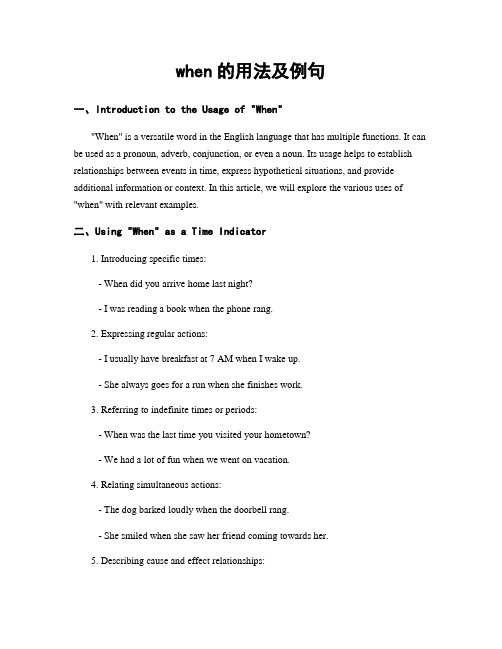
when的用法及例句一、Introduction to the Usage of "When""When" is a versatile word in the English language that has multiple functions. It can be used as a pronoun, adverb, conjunction, or even a noun. Its usage helps to establish relationships between events in time, express hypothetical situations, and provide additional information or context. In this article, we will explore the various uses of "when" with relevant examples.二、Using "When" as a Time Indicator1. Introducing specific times:- When did you arrive home last night?- I was reading a book when the phone rang.2. Expressing regular actions:- I usually have breakfast at 7 AM when I wake up.- She always goes for a run when she finishes work.3. Referring to indefinite times or periods:- When was the last time you visited your hometown?- We had a lot of fun when we went on vacation.4. Relating simultaneous actions:- The dog barked loudly when the doorbell rang.- She smiled when she saw her friend coming towards her.5. Describing cause and effect relationships:- He became ill when he ate spoiled food.- The plants flourished when they received enough sunlight.三、Using "When" in Hypothetical Situations1. Present hypothetical situations (conditional):- When you see him, can you ask him if he wants to join us?(Assuming you will encounter him in the near future)2. Past hypothetical situations (unreal conditional):- Anne would have been upset if she hadn't passed her exam.(But in reality, she did pass)3. Future hypothetical situations (contrary-to-fact conditional):- If it wasn't raining tomorrow, we could have a picnic.(However, it is expected to rain, so the picnic is unlikely)四、Using "When" as a Subordinating Conjunction1. Describing an action that happens at some point during another action:- When she arrived at the party, everybody greeted her.- Let's call her when we finish our dinner.2. Indicating repetition or regularity:- She cries every time when she watches sad movies.- We always go for a walk in the park when it is sunny.3. Providing extra information or context:- Jenny, when she was younger, wanted to be an astronaut.(Additional information about Jenny's past aspirations)五、Using "When" as a Noun1. Referring to a specific moment or occasion:- He knew the answer to the question before anyone else did – that's when his expertise shone through.(Referring to the specific moment his expertise became evident)2. Describing a particular period of time:- The medieval period was marked by internal conflicts and external invasions – a period known as "when Europe was in turmoil."(Describing a specific era of European history)六、ConclusionIn conclusion, "when" is a versatile word in the English language with various uses and applications. Whether used as a time indicator, in hypothetical situations, as a subordinating conjunction, or even as a noun, "when" helps create clarity and convey meaningful relationships between events and actions. Mastering its usage will enhance your ability to communicate effectively in English.。
小学英语疑问代词的用法
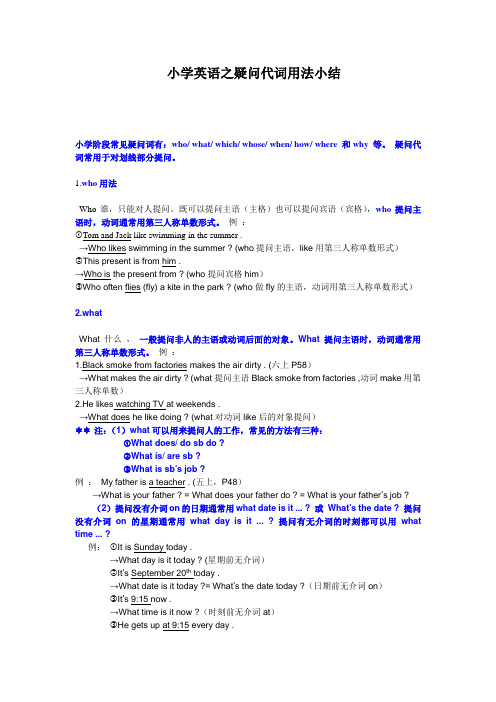
小学英语之疑问代词用法小结小学阶段常见疑问词有:who/ what/ which/ whose/ when/ how/ where 和why 等。
疑问代词常用于对划线部分提问。
1.who用法Who谁,只能对人提问。
既可以提问主语(主格)也可以提问宾语(宾格),who提问主语时,动词通常用第三人称单数形式。
例:①Tom and Jack like swimming in the summer .→Who likes swimming in the summer ? (who提问主语,like用第三人称单数形式)②This present is from him .→Who is the present from ? (who提问宾格him)③Who often flies (fly) a kite in the park ? (who做fly的主语,动词用第三人称单数形式)2.whatWhat 什么,一般提问非人的主语或动词后面的对象。
What提问主语时,动词通常用第三人称单数形式。
例:1.Black smoke from factories makes the air dirty . (六上P58)→What makes the air dirty ? (what提问主语Black smoke from factories ,动词make用第三人称单数)2.He likes watching TV at weekends .→What does he like doing ? (what对动词like后的对象提问)注:(1)what可以用来提问人的工作,常见的方法有三种:①What does/ do sb do ?②What is/ are sb ?③What is sb’s job ?例:My father is a teacher . (五上,P48)→What is your father ? = What does your father do ? = What is your father’s job ?(2)提问没有介词on的日期通常用what date is it ... ? 或What’s the date ? 提问没有介词on的星期通常用what day is it ... ? 提问有无介词的时刻都可以用what time ... ?例:①It is Sunday today .→What day is it today ? (星期前无介词)②It’s September 20th today .→What date is it today ?= What’s the date today ?(日期前无介词on)③It’s 9:15 now .→What time is it now ?(时刻前无介词at)③He gets up at 9:15 every day .→What time does he get up every day ? (时刻有介词at)3.WhichWhich 哪一个,表示特指某个人或物。
初中英语副词性从句的用法小结
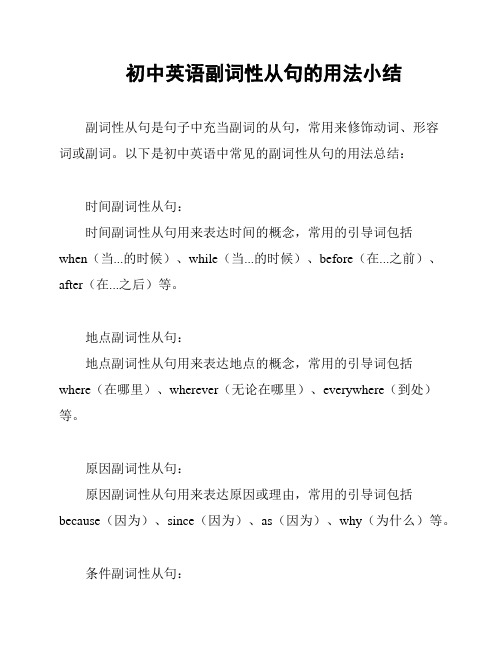
初中英语副词性从句的用法小结副词性从句是句子中充当副词的从句,常用来修饰动词、形容词或副词。
以下是初中英语中常见的副词性从句的用法总结:时间副词性从句:时间副词性从句用来表达时间的概念,常用的引导词包括when(当...的时候)、while(当...的时候)、before(在...之前)、after(在...之后)等。
地点副词性从句:地点副词性从句用来表达地点的概念,常用的引导词包括where(在哪里)、wherever(无论在哪里)、everywhere(到处)等。
原因副词性从句:原因副词性从句用来表达原因或理由,常用的引导词包括because(因为)、since(因为)、as(因为)、why(为什么)等。
条件副词性从句:条件副词性从句用来表达条件或假设的情况,常用的引导词包括if(如果)、as(如果)、unless(除非)等。
目的副词性从句:目的副词性从句用来表达目的或意图,常用的引导词包括so that(以便)、in order that(为了)等。
结果副词性从句:结果副词性从句用来表达结果或影响,常用的引导词包括so (所以)、that(如此)等。
比较副词性从句:比较副词性从句用来进行比较,常用的引导词包括than(比)、as(像)、as...as(和...一样)等。
方式副词性从句:方式副词性从句用来表达方式或方法,常用的引导词包括as (如)、like(像)、the way(方式)等。
转折副词性从句:转折副词性从句用来表达转折或相反的情况,常用的引导词包括although(虽然)、while(然而)、but(但是)等。
总结:副词性从句在句子中起到修饰的作用,在初中英语中有多种用法。
熟练掌握这些用法可以帮助我们更好地理解和运用句子。
因此,我们应该多加练和积累,以提高自己的英语水平。
以上是初中英语副词性从句的用法小结。
when的用法总结
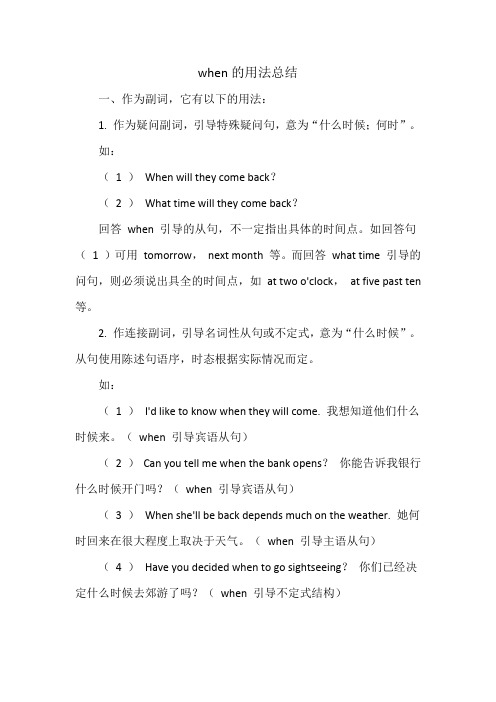
when的用法总结一、作为副词,它有以下的用法:1. 作为疑问副词,引导特殊疑问句,意为“什么时候;何时”。
如:(1 )When will they come back?(2 )What time will they come back?回答when 引导的从句,不一定指出具体的时间点。
如回答句(1 )可用tomorrow,next month 等。
而回答what time 引导的问句,则必须说出具全的时间点,如at two o'clock,at five past ten 等。
2. 作连接副词,引导名词性从句或不定式,意为“什么时候”。
从句使用陈述句语序,时态根据实际情况而定。
如:(1 )I'd like to know when they will come. 我想知道他们什么时候来。
(when 引导宾语从句)(2 )Can you tell me when the bank opens?你能告诉我银行什么时候开门吗?(when 引导宾语从句)(3 )When she'll be back depends much on the weather. 她何时回来在很大程度上取决于天气。
(when 引导主语从句)(4 )Have you decided when to go sightseeing?你们已经决定什么时候去郊游了吗?(when 引导不定式结构)3. 作疑问代词,常和介词since,till,up to 等连用,意为“什么时候”。
如:(1 )Since when have they had the house?他们从什么时候起有这幢房子的?(2 )Till when is the library open?图书馆开放到几点呢?4. 作关系副词,引导限制性定语从句和非限制性定语从句。
如:(1 )The days are gone forever when the Chinese people were looked down upon. 中国人民被人轻视的日子一去不复返了。
九种状语
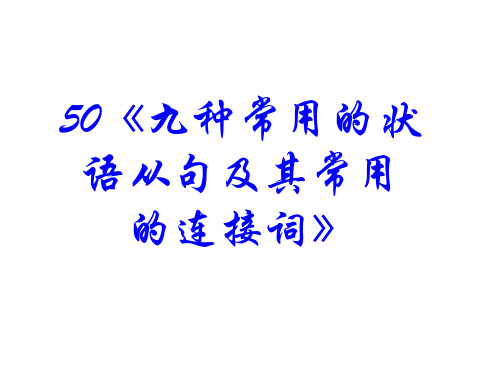
1. (01北京春)-Did you remember to give Mary the money you owed her? -Yes. I gave it to her ______ I saw her. B A. while B. the moment C. suddenly D. once 2. (1998上海) I thought her nice and honest ______ I met her. A. first time B. for the first time C. D. by the first time C the first time 3.______ entered the office when he realized that he had forgotten his report. A. He hardly had B. Had he hardly C Hardly had he C. D. Hardly he had
连接词while的用法小结
1. while引导的动作必须是持续性的,侧重主句动作和从句动作相对 比。如: Please don’t talk so loud while others are working. 2.while作为并列连词,意为“而,却”,表示对比。 3.while可表示尽管,相当于although。
1. (03北京春) -Was his father very strict with him when he was at school? -Yes. He had never praised him ______ he became one of the top students in his grade. A. after B. unless C C. until D. when 2.(03上海) A good storyteller must be able to hold listeners’ curiosity ______ he reaches the end of the story. A. when B. unless D until C. after D. 3.It was not ______ she took off her dark glasses ______ I realized she was a famous film star. B until; that A. when; that B. C. until; when D. when; then
特殊疑问词用法小结归纳与配套练习(四年级)

特殊疑问词用法小结归纳与配套练习Name: __________ Class: __________1)when 什么时间,问时间2)who 谁,问人3)where 在哪里,问地点4)what什么,问东西5)what time 什么时间,问时间6)how …怎么样,问情况7)what colour 什么颜色,问颜色8)how old 多大,问年龄9)what day 星期几,问星期10)how far 多远,问路程11) how many 多少,问数量12)how much 多少,问价钱13)how often多久, 多经常一、练一练1) A: _______ is your best friend? B:He’s Mike.2) A: _______ is the ball? B:It’s under the chair.3) A: _______ are the shoes? B:They are 25 yuan.4) A: _______ is the curtain? B:It’s blue.5) A: _______ is it today? B:It’s Sunday.6) A:_______ is your brother? B: He’s 15 years old.7) A:_______ do you play football? B: At 6 o’clock.8)A: _________ boys are there in the classroom? B: There are 9.9) A:_______ are you? B: I am ten.10) A: _______ is your favourite food? B: I like pizza.11) A: _______ is it ? B: It’s half past ten.二、选择准确的单词填空(who, where, when)1.______ is the girl? She is Emma.2.______ are Jack and Tom? They are behind the desk.3.______ do you go to school? I go to school from Monday to Friday.4.______is wearing a purple dress? Sarah is wearing a purple dress.5.______ are they? They are my teachers.6.______ is the cat ? It is under the sofa.7.______ are you going? We are going to the park.8.______ is his birthday? His birthday is in August.9. ______ is Miss White? She is my English teacher.10. ______ can we play table tennis? You can play table tennis in the park.三、根据提示回答下列问题。
While的用法小结
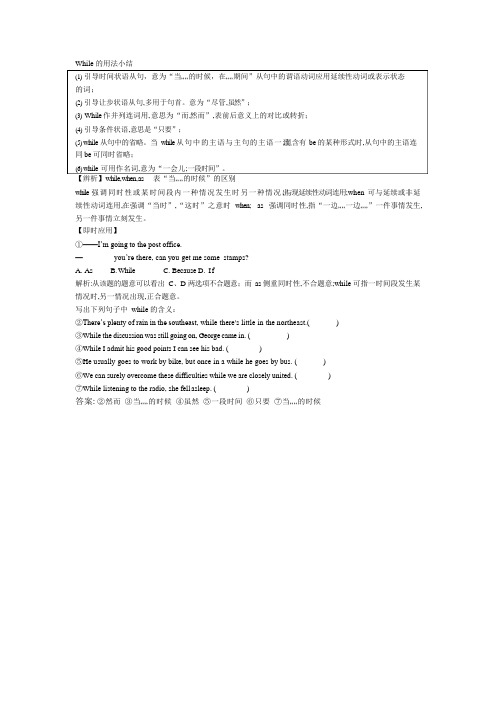
While 的用法小结(1)引导时间状语从句,意为“当……的时候,在……期间”从句中的谓语动词应用延续性动词或表示状态的词;(2)引导让步状语从句,多用于句首。
意为“尽管,虽然”;(3)While 作并列连词用, 意思为“而,然而”,表前后意义上的对比或转折;(4)引导条件状语,意思是“只要”;(5)while 从句中的省略。
当while 从句中的主语与主句的主语一致,且含有be 的某种形式时,从句中的主语连同be 可同时省略;(6)while 可用作名词,意为“一会儿;一段时间”。
【辨析】while, w hen, a s 表“当……的时候”的区别while 强调同时性或某时间段内一种情况发生时另一种情况出,与现延续性动词连用;when 可与延续或非延续性动词连用,在强调“当时”,“这时”之意时when; as 强调同时性,指“一边……一边……”一件事情发生,另一件事情立刻发生。
【即时应用】①——I’m going to the post office.—_______ you’re there, can you get me some stamps?A. AsB. WhileC. BecauseD. If解析:从该题的题意可以看出C、D 两选项不合题意;而as 侧重同时性,不合题意;while 可指一时间段发生某情况时,另一情况出现,正合题意。
写出下列句子中while 的含义:②There’s plenty of rain in the southeast, while there's little in the northeast.( )③While the discussion was still going on, George came in. ( )④While I admit his good points I can see his bad. ( )⑤He usually goes to work by bike, but once in a while he goes by bus. ( )⑥We can surely overcome these difficulties while we are closely united. ( )⑦While listening to the radio, she fell asleep. ( )答案: ②然而③当……的时候④虽然⑤一段时间⑥只要⑦当……的时候。
- 1、下载文档前请自行甄别文档内容的完整性,平台不提供额外的编辑、内容补充、找答案等附加服务。
- 2、"仅部分预览"的文档,不可在线预览部分如存在完整性等问题,可反馈申请退款(可完整预览的文档不适用该条件!)。
- 3、如文档侵犯您的权益,请联系客服反馈,我们会尽快为您处理(人工客服工作时间:9:00-18:30)。
when 用法小结不管是在口语中,还是在书面语中,when是一个十分活跃的词,该词主要用作连词和副词,但是在意义方面其用法比较复杂。
一、作副词1. 作疑问副词,用于构成特殊疑问句,意为“什么时候;何时”When will they come back?他们什么时间回来?When can you finish the work? 你什么时间能完成这项工作?2. 作连接副词,引导名词性从句,或与不定式连用,意为“什么时候”Can you tell me when the bank opens?你能告诉我银行什么时候开门吗?When she'll be back depends on the weather. 她何时回来取决于天气。
Have you decided when to go sightseeing?你们已经决定什么时候去郊游了吗?3. 作关系副词,引导定语从句。
The main school holidays are from mid-December till early February,when the days are long and warm.Do you remember the time when the three of us went on a holiday in Guilin?你还记得我们三个人在桂林度假的那段时光吗?二、作从属连词,引导状语从句。
1. 表示时间,意为“当……时;在……的时候”When you see him, please say hello to him. 见到他时,代我问他好。
When I reached the station,the train had left. 当我到达火车站时,火车已经开走了。
2. 表示条件,相当于ifHow can I get a job when I can't even read or write?如果我连读和写都不会,我怎么能找到工作呢?3. 表示对比,相当于whereas, while, since, 意为“既然;然而”How can I help them to understand when they won't listen to me?既然他们不愿听我的,我又怎么能帮助他们弄明白呢?4. when 从句中使用虚拟语气,意为“本来……却……”She paid when she could have entered free. 本来可以免费入场,而她却付了款。
She stopped trying when she might have succeeded next time.她本来下次有可能获得成功,但她却不再尝试了。
三、作并列连词表示前面的叙述所没有提到过的信息,对所描述的事件予以引人注目的强调,意为“这时;突然”大致有以下三种情况:1. be doing sth. whenI was thinking of this when I heard my name called. 我正想着这件事,突然听到有人叫我的名字。
2. be about to do sth. whenWe were about to start when it began to rain. 我们刚要出发就开始下雨了。
3. sb. had hardly/scarcely/barely... whenWe had hardly fallen asleep when the bell rang. 我们刚刚入睡,铃声就响了起来。
四、作代词,意为“什么时候,何时”,常用在since,till,up to等之后。
Since when have you been interested in my feelings?你从什么时候起开始关心起我的感受来了?when 用法一. when 用作副词。
1. 用作疑问副词,引导特殊疑问句。
例如:When are they going to visit the Great Wall? 他们打算什么时候去游览长城?2. 用作连接副词,通常用来引导主语从句、表语从句、同位语从句、宾语从句及起名词作用的“ when +动词不定式”结构。
例如:When he comes is not known. 他何时来还不知道。
The morning is when I am busiest. 早上是我最忙的时候。
I have no idea when the game will begin. 我不知道比赛何时开始。
I don't know when the plane takes off. 我不知道飞机何时起飞。
I don't know when to leave for London. 我不知道该在何时动身去伦敦。
3. 用作关系副词,引导限定性定语从句和非限定性定语从句。
例如:Do you still remember the days when we stayed in America? 你还记得我们呆在美国的那些The day will come soon when the Chinese astronauts will go to the moon.It happened ten years ago, when I was a child. 事情发生在十年前,当时我还是个小孩子。
二. when 用作连词。
1. 用作从属连词,意为“当……的时候”,引导时间状语从句。
例如:They learned a lot from the peasants when they stayed in the village.It was snowing when he arrived at the station. 他到达车站时,天正下着雪。
注意:如果when 引导的从句中的主语和主句中的主语一致,且从句中的谓语动词是“ be +分词”或从句主语是it ,则be 动词及其主语常可省略。
例如:When (he was )asked why he was late, he made no answer. 当被问到他为什么迟到时,他避而不答。
I'll tell him about it when (it is )possible. 在可能的时候,我会把那件事告诉他的。
2. 用作从属连词,意为“一……就……”,引导时间状语从句。
例如:We will stand up when the teacher comes into the classroom. 老师一进教室我们就起立。
Fire the rockets when I give the signal. 我一发信号,你就点燃火箭。
3. 用作从属连词,意为“还没/ 刚刚……就”,引导时间状语从句。
例如:I had hardly opened the door when he came in. 我刚一开门,他就进来了。
4. 用作从属连词,意为“倘若,如果”,表示条件。
例如:He will be likely to recover when he is operated on. 如果动手术,他有可能康复。
Turn off the switch when anything goes wrong with the machine. 如果机器发生故障,就把电5. 用作从属连词,意为“既然,尽管”,表示让步。
例如:Why use metal when you can use plastic? 既然能用塑料,为什么用金属呢?They kept trying when they knew it was hopeless. 尽管他们知道那件事没有希望6. 用作并列连词,意为“在那时,届时”,表示时间。
这时主句中可以用过去进行时,过去完成时或“ was/were about to do sth. ”结构。
例如:Last night I was about to go to bed when the phone rang. 昨天晚上我正要上床睡觉时,电话铃响了。
I was cooking in the kitchen when someone knocked at the door. 我正在厨房做饭,这时有人敲门。
He had just finished the book when supper was served. 我刚刚读完这本书,这时晚饭就端上来了。
7. 用作并列连词,意为“虽然、然而、可是”,表示转折。
例如:He usually walks to work when he might take a bus. 虽然他可以坐公共汽车上班,但他却常常步行上班。
I had only twenty dollars when I needed thirty to buy the dictionary.我需要30 美元买那本字典,可是我只有20 美元。
8. 用作并列连词,意为“而、却”,表示对比。
例如:How can he say that everything is fine when it's obvious that it is not? 他怎能说一切都好呢?情况显然不是那样。
三. when 用作代词。
when 作为代词常常位于介词之后,意为“那时,什么时候”。
例如:We came back on Tuesday, since when we have been working in the repair shop. 我们星期二回来,从那时起就一直在修配车间工作。
Since when have you been studying Japanese? 你是从何时起一直学习日语的?另外,when 还可用作名词,前面常常用定冠词the 。
the when 表示事件发生的时间,常常与the where, the how 并列使用。
例如:He told the police the when and the how of the accident. 他告诉警察事故发生的时间及发生的原委。
